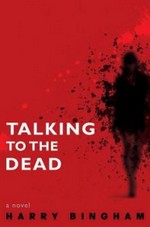 Love Story, With Murders
Love Story, With Murders
by Harry Bingham
Series: Fiona Griffiths, #2
Kindle Edition, 449 pg.
Sheep Street Books, 2016
Read: January 4 – 8, 2018

For me, these things aren’t only about finding the killers, but about giving peace to the dead. It’s not primarily a question of justice. The dead don’t care about that. The murder investigation, arrest and conviction are just part of the funeral rite, the final acts of completion. Gifts I bring the dead in exchange for the peace they bring me.
The peace of the dead, which passeth all understanding.
DC Fiona Griffiths continues her efforts to act normal, maybe even feel normal, getting along with her boyfriend and staying out of trouble with her superiors. Basically, things are going as well as they possibly can following the events of Talking to the Dead. But we know that’s going to come to an end, otherwise, this would be a really dull series. It comes to an end when Fiona and a colleague stop off on their way home to look at a case of illegal rubbish. In this particular case, the rubbish is a body part in a chest freezer. It’s a significant enough body part to make the detectives sure they’re looking for something more serious than illegal rubbish.
Over the next few days, the police are able to find some more of the woman, as well as start to understand how long ago she was killed and dismembered — which leads to an identification. Shortly thereafter, the police find pieces of a fresher corpse in the same area. While most detectives look for connections between the victims and hunt for clues to identify the killer, Fi begins learning more about the victims as individuals (not that she’s alone in this, it’s just she’s alone in her approach), what their lives were like, and what would lead someone to kill them. Fi investigates things in a way no other fictional detective — private or police — does. I’m not sure I can express it clearly, but when you read it, you’ll notice. When she starts to put the pieces together about what was going on the whole time, I was flummoxed — it’s nothing like where I expected things to go.
Aside from that are the relationships with her boyfriend, family and fellow police officers. The romance between Buzz and Fi is very strange, but sweet. She’s dealing with a different superior for these investigations. It’s not just Fi up to the same antics with a different boss — similar antics, yes, but Fi understands herself better now, and is able to do what she does in a way that her superiors are able to accept and use. As for her family? I’m not even going to try to talk about it.
Some people are better as corpses. They’re easier to like.
On the one hand, I really like watching Fi’s subconscious at work, making the connections, deductions, and guesses she needs to be making to solve the crime/find what she’s looking for, while she interprets it as “the dead” talking to her. Well, that’s one way to read it, anyway. It really could be that there’s something on the verge of supernatural going on. I like the hint of ambiguity that Bingham has given this world and Fi’s understanding of what’s going on.
I was, I don’t want to say surprised, but it was something like it by the ending. Maybe I’ve just been reading too many Mysteries lately with pretty ambiguous endings, but this one had a very satisfying ending with most of the loose ends tied up. This doesn’t mean that everything ended happily (for want of a better term), but that Fi’s fully able to satisfy her curiosity and need to know (at least about those things that came up in her professional life — her personal life is only slightly more settled by the book’s end than it was when it started).
A murder mystery — with, yes, a love story — that had some fantastic character moments, a really strong puzzle, all very well told. Fiona Griffiths impresses again. This is the best kind of sequel — the same kind of things that filled the first book in the series, but seen differently by everyone (including the protagonist) and with different results — Fi’s grown a bit (I want to stress “a bit,” she’s still basically the same person, which is good, I don’t want everything to be “normal” for this character), and is building on the events from the previous novel, not just repeating them. I’m truly annoyed with myself for waiting so long to get back to this series, and will not make the same mistake.
—–



